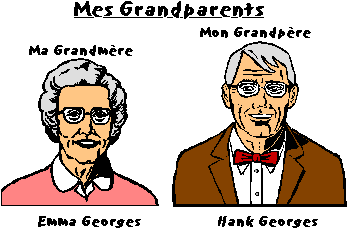French Level 1
Unit 5: Leçon 2

|
Les Pronoms Possessifs
|
As you were looking through Luc's album and listening to him speak, did you notice that he included the words: mon, ma, and mes in his family descriptions? I'm sure that you have already figured out that these words are the French equivalent of the English pronoun, "my"! Why do French people have three ways to say "my" and in English there is only one? (No, it is not to try and make you confused or crazy!!) It is because pronouns in French take a masculine or feminine form depending on the gender of the noun that follows them. Here is an example:
Check out the photo below:
 Track 45 Track 45

|
As you have probably already guessed, when a noun is plural, the possessive pronoun must be plural too. Thus the English phrase 'My Grandparents' becomes Mes Grandparents en francais!
Now look at Luc's grandmother. Notice that the word "ma" is used with "grand-mère". That's because "ma" is the feminine form for "my". Now Luc isn't female, he is male, so you are probably wondering why it is that he uses the word "ma" when talking about his grandmother. The answer is simple. The form of "ma" used must fit with the person or thing being discussed. It is not affected in any way by the speaker of the phrase. Thus Luc isn't confused about his own gender (masculine) when he chooses to use the word "ma" in the phrase, "Ma grandmère". Instead, he is certain about the gender of his grandmother (feminine) and he has expressed it correctly.
For his grandfather, Luc uses the masculine form, "mon" because his grandfather is male, not because Luc is male. Got it? Great!
Continuons au leçon suivant (Let's continue with the next lesson)!

|